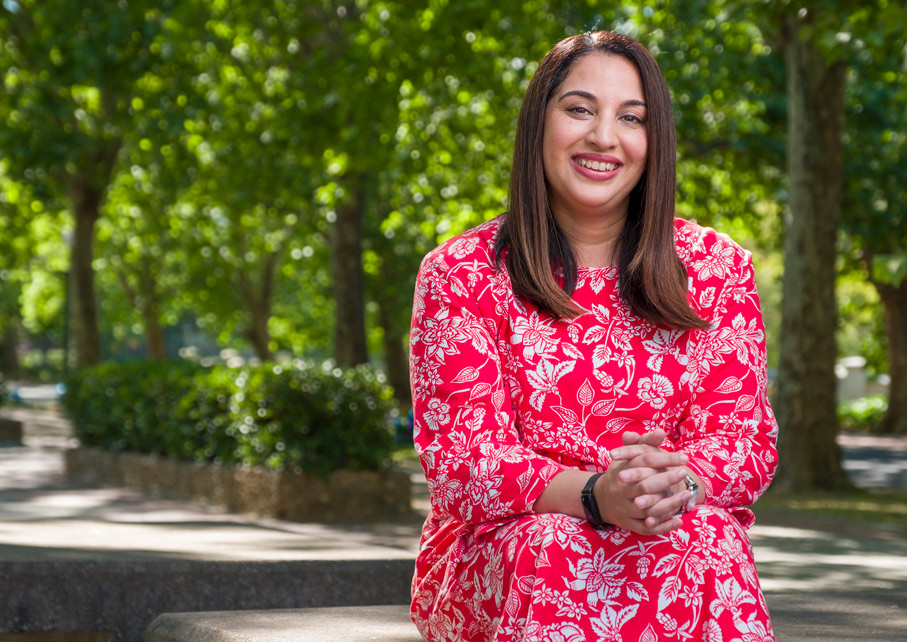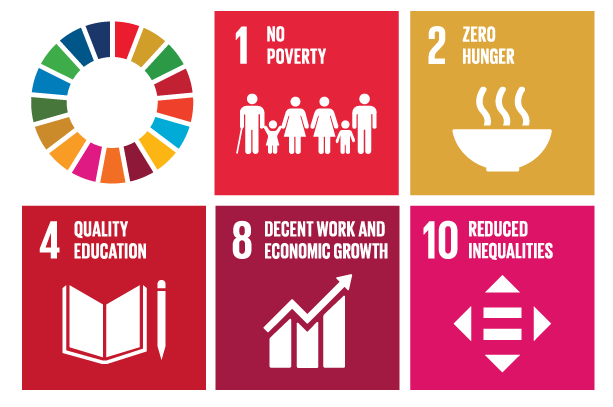Wellness of body and mind: Women’s health researcher explores the link
As a researcher in the field of health psychology, discovering the connections between women’s physical and mental health lies at the heart of Prof Rizwana Roomaney’s work.
Her passion lies in better understanding the psychological, behavioural, and social aspects of illness, health and healthcare so as to better understand people. Greater mutual understanding can lead to a better world, she believes.
Based in Stellenbosch University’s (SU’s) Department of Psychology, Roomaney specialises in women’s health and psychology. She is the national delegate for South Africa at the European Health Psychology Society and the chair of the Health Psychology Division of the Psychological Society of South Africa.
In Roomaney’s mind, being a little unsure of what comes next is no reason for concern — this National Research Foundation (NRF) Y1-rated research psychologist knows that not knowing is simply a starting point for questions, conversations, and maybe even personal evolution.
Her research is aimed at creating space for discussion, engagement, and greater understanding around women’s health on all the levels it manifests — from the literal to the metaphorical and mental. She wants women to ask questions about their bodies and sexual and reproductive health. By building awareness and promoting education, she is trying to break down stigmas and shatter taboos. She believes that shifting the dynamics of how women feel about their bodies can improve their mental health and wellness.
Recent research and interests
Roomaney’s recent work includes a study of how neuroticism and anxieties impact people’s health-seeking behaviour. The study found that, without social support to manage neuroses, participants felt discouraged from seeking help. Conversely, when the participants’ anxieties were addressed, they became more willing to seek professional medical help and treatment.
Roomaney has also researched how cancer-related fatigue negatively impacts quality of life among cancer patients yet isn’t considered a priority in treatment plans. This research reinforced Roomaney and her colleagues’ emphasis on the need to communicate about and address fatigue as part of appropriate cancer treatment strategies.
In addition, Roomaney has been part of a study examining the experiences of gender-diverse people in seeking healthcare for endometriosis. She and her colleagues found that gender-diverse patients face additional barriers in seeking help in the form of medical gaslighting, misgendering (assigning of the wrong gender), and discrimination. Participants expressed not feeling safe to disclose their gender or to speak openly about their health concerns to non-sensitised cisgender healthcare providers.
Another of Roomaney’s growing interests is how patient populations use online spaces in relation to their health behaviours and health cyberpsychology.
While her research is centred on women’s health, she believes that collaboration and the finding of more intersecting points across disciplines are key to growing knowledge to the benefit of more patients. Roomaney has supervised students’ research on various topics, including breast cancer, gynaecological cancers, endometriosis, premenstrual dysphoric disorder, and polycystic ovarian syndrome.
The road to women’s health research
Roomaney’s journey to work on women’s health started off in quite a different direction. As a young student, she arrived in Johannesburg from Cape Town and enrolled at the University of the Witwatersrand to study dentistry.
“I just didn’t enjoy it, though, and every day I liked it less. Then one day, I was looking at an occupational therapy student’s psychology textbook and thought it was really interesting. The next year, I changed my course to psychology and it just felt right,” she says.
It was later, as a research assistant in her honours year at the University of the Western Cape, that Roomaney’s deepening interests in psychology and women’s health came to a happy collision. At the time, her supervisor was doing her PhD on the experiences of women with high-risk pregnancies.
“I remember reading her research proposal, and I just couldn’t put it down. I had never thought about women’s experiences in high-risk pregnancies before. What I read just grabbed me, and I too decided to focus on high-risk pregnancy that year.
“I am always fascinated by women and what they go through and how they seek help or don’t seek help for their physical and mental health,” she says. She paints the picture, for instance, of depression that could set in after a diagnosis of cancer, the trauma of miscarriages, or years of infertility.
“We need to normalise getting help. Women still feel isolated or judged, and, very often, are so busy tending to everyone else’s needs that their needs are at the very bottom of the list.”
And bringing about such change should start with focusing on girls, and also boys. Both girls and boys should understand menstruation, sexual maturation, and sexual functioning, she says. As such, clinics, schools, and homes ought to be spaces in which people can discuss issues openly and not feel judged, shamed, or dismissed.
Shifting perspectives
According to Roomaney, South Africa’s awareness of mental health has shifted in recent years, particularly after the Life Esidimeni tragedy exposed in late 2016. The latter resulted from a decision by the Gauteng Department of Health to transfer 1 711 mental health patients from facilities operated by private healthcare provider Life Esidimeni to other, cheaper facilities where service providers proved to be ill-equipped, unqualified, and uncertified to provide adequate care to mental health patients. This decision led to large-scale neglect in care and the subsequent death of 144 mental health patients.
Roomaney says this tragedy should still ring a plangent alarm bell for the national provision of mental health services: “We need massive investment in mental health that supports interventions at every level, including screening and support, and ways to make counselling part of a patient’s treatment plan. We also need to be able to support doctors and nurses who are under tremendous mental stress and experiencing burnout.”
This ultimately demands society at large to shift towards not only an awareness of mental health issues but also the showing of a bit more kindness, consideration, or — at the very least — decency. “The layperson isn’t a psychologist, but we can still listen to each other, let each other talk, and simply be more aware of each other’s issues.”
Opportunities for kindness
Roomaney’s teenage son calls her “a bit of a softie”. Sometimes, he jokingly warns her that it will lead to her being taken advantage of. But she sees it differently. For her, choosing a different response in a world that hardens far too quickly is actually a choice made with deliberate intention and, therefore, power.
Roomaney is the person behind the SU Department of Psychology’s Krotoa Cares initiative. It all started with her idea to create a women’s hygiene table in the department. Tampons, deodorant, soap, and other hygiene products are free to those women who need them. She soon realised, however, that men had a similar need and introduced such a table of small kindnesses for men, too.
“I always say that people need opportunities to be kind, and I have seen this in action through this initiative, which has always worked on the principle of ‘if you need to take, take; if you have, give’. Seeing how generous people can be never fails to delight me. Sometimes I leave a bucket for donations in class and students always have something to share,” she says.
The project, named after the building that houses the University’s history and psychology departments, has since expanded to offer some non-perishable groceries. This resulted from Roomaney’s realisation that over and above their need for sanitary and hygiene products, many people on campus were also going hungry.
Curing through kindness
For Roomaney, being kind offers a way to explore issues more deeply, be it in the form of tough conversations with her 14-year-old son, engaging with her students, or just dealing with the modern world. It is through the experience of kindness that discomforts, traumas, and mental health burdens can be faced up to rather than avoided. She believes kindness also offers fertile ground on which hope can grow, hope being the antidote to the mental health burden carried by so many people today, she says.
“We are human beings and we feel things.” Sometimes, she says, the world is a sad, hard place to live in. “But we can find help. We can also think about what we can control, where we can have an impact, and focus more on that,” she says.
Finding such a mental balance, Roomaney believes, involves taking personal timeouts. For her, this takes the form of indulging in ‘trashy’ novels — the $1 or $2 Kindle Hallmark stories, she says with a laugh. These casual reads also serve to balance her stack of non-fiction books on topics ranging from astrophysics to exercise. “I love reading; it really helps me to switch off.” Naturally, really good chocolate is another indulgence, and her cat Cosmo — who’s on her phone’s home screen — also adds significantly to her happiness quotient.
In the end, she says, peace of mind involves resting your awareness on the unanswered questions without needing to rush to find the answers. It’s what she tells her students, too. She says: “Life isn’t an end game. I don’t know if I will always be a professor… Maybe I end up having a gardening service or a restaurant. We should allow ourselves to evolve and let what happens next, happen.”

Prof Rizwana Roomaney
Photo by Stefan Els
Written by Ufrieda Ho

Stellenbosch University currently hosts 50 research chairs, 20 of which form part of the South African Research Chairs Initiative (SARChI), funded by the Department of Science and Innovation (DSI), through the National Research Foundation (NRF).
Useful links
World Cancer Day | ‘We urgently need to increase cervical cancer screening’ — Dr Rizwana Roomaney
‘Endometriosis beyond the boundaries of gender’
Dr Roomaney — one of 51 SA academics selected for advancement programme
Endometriosis: One in ten women experience this debilitating and isolating condition
X (formerly Twitter): @SUHealthSci, @rizwanaroomaney, @MatiesResearch, and @StellenboschUni

The research initiatives reported are geared towards addressing the United Nations’ Sustainable Development Goals numbers 1, 2, 4, 8, and 10, and goals number 1, 2, and 18 of the African Union’s Agenda 2063.